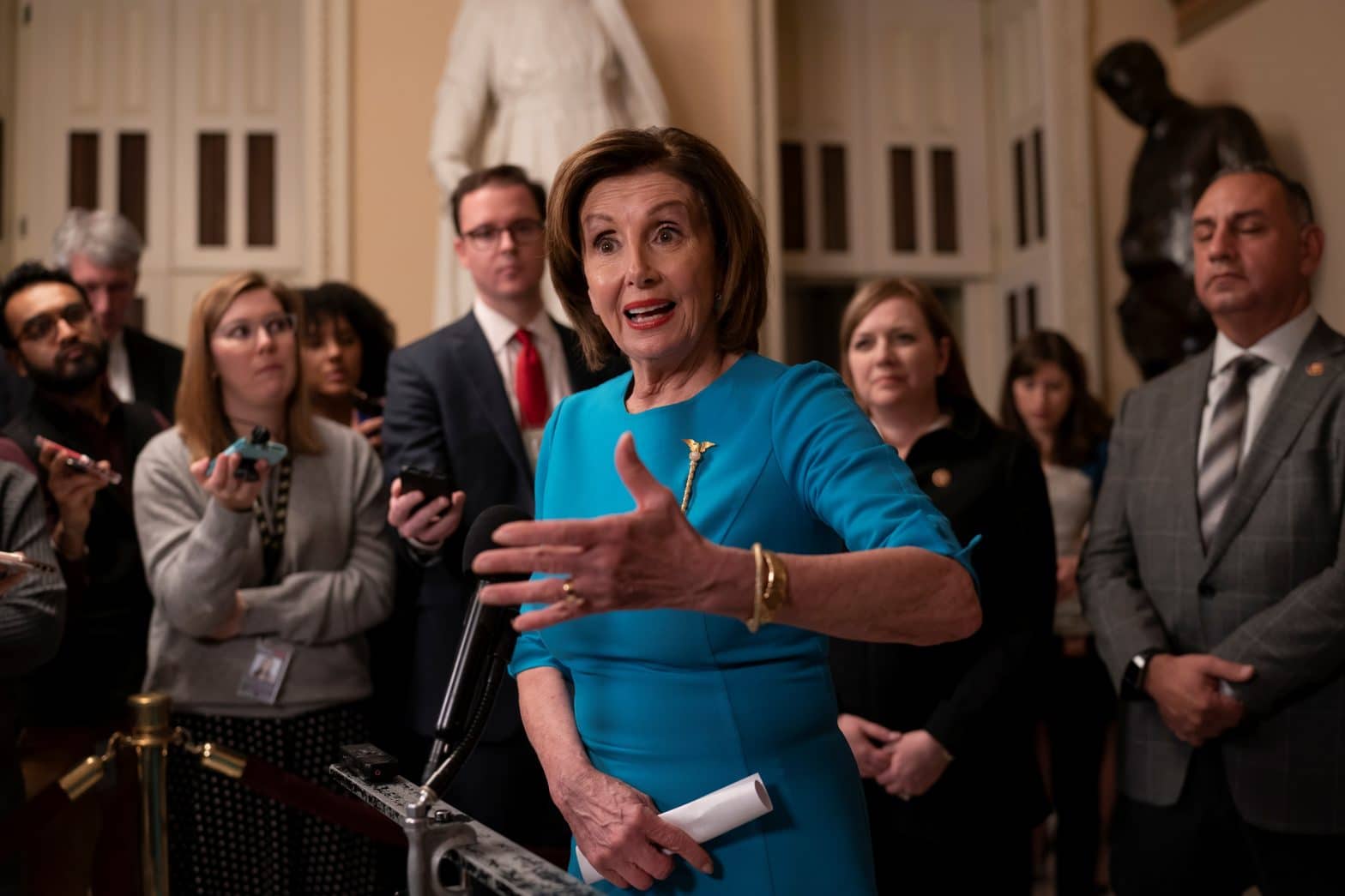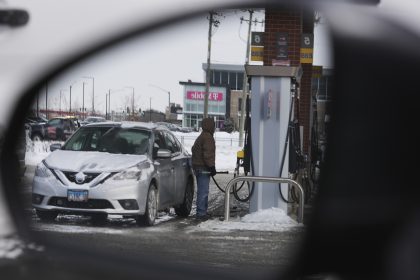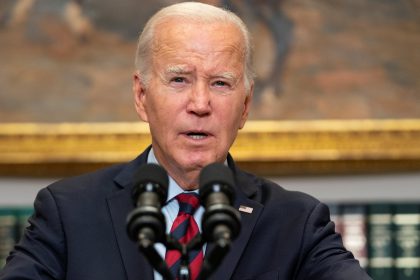House Strikes Deal With White House, Passes Sweeping Coronavirus Relief Package

WASHINGTON – The House passed an emergency spending package in overwhelmingly bipartisan fashion Saturday morning, just hours after reaching an agreement with the White House on the next steps in addressing the unfolding coronavirus outbreak.
The vote on the 110-page bill, which will provide billions of dollars to help sick workers and to prop up the economy, was 363-40. It was immediately sent to the Senate for a vote next week.
Last week the US Congress approved $8.3 billion in emergency funding for federal agencies fighting the spread of the virus.
The new legislation, H.R. 6201, which includes two weeks paid sick leave and up to three months of paid family and medical leave, also expands unemployment insurance and increases federal funding for Medicaid, according to a letter House Speaker Nancy Pelosi sent to Democratic members of the House Friday evening.
Pelosi said the House would soon begin working on another bill “to protect the health, economic security and well-being of the American people.”
Pelosi’s letter was released just hours after President Donald Trump told reporters in the White House Rose Garden that no deal had been reached.
“We don’t think the Democrats are giving enough. We’re negotiating,” Trump said. “We thought we had something but all of a sudden they didn’t agree to certain things that they agreed to.”
In fact, Pelosi had been negotiating with Treasury Secretary Steven Mnuchin all week, and those negotiations became even more intense on Friday, when the two reportedly spoke 13 times by phone.
In the end, House Democrats dropped a proposal to establish a new paid sick leave entitlement for public health emergencies and added tax credits for small- and medium-size businesses requested by Republicans.
After the House vote, Majority Leader Steny Hoyer, D-Md., said Democrats had “worked tirelessly with the Trump administration and with Republicans in the House and Senate to ensure this is a truly bipartisan bill.
“I thank Members on both sides of the aisle for joining together and voting for this bill to reassure the American people that we are focused on doing everything we can to respond to this pandemic,” he said.
National Emergency Declared
As Pelosi and Mnuchin moved closer to a deal on Friday, President Trump held a Rose Garden news conference to announce he was declaring a national emergency, freeing up additional resources and funding as federal, state and local governments move to rein in the public health crisis.
Among other things, the move allows the Federal Emergency Management Agency to tap into more than $40 billion from the Disaster Relief Fund to mobilize personnel more quickly to help state and local agencies.
“The action I am taking will open up access to a large amount of money for states and territories in our shared fight against this disease,” Trump said.
In addition to declaring the national emergency, the president said the federal government will also waive interest on federal student loans and purchase crude oil to boost the country’s strategic petroleum reserve.
“No resource will be spared, nothing whatsoever,” the president said.
Standing alongside the president as he spoke were Vice President Mike Pence, top health officials, and the chief executives of several major retailers.
The retailers, representing companies like Wal-Mart and Walgreens, were on hand to announce they will set aside parts of their store parking lots to facilitate “drive-through” testing for the coronavirus.
The White House had been criticized for not ramping up testing faster, but Trump said on Friday the capacity to carry out tests had been “vastly increased” and that 5 million coronavirus tests will be available by the end of the month.
Toward that end, on Friday morning, the administration approved a test made by the Swiss pharmaceuticals group Roche, and bestowed grants on two other companies that are developing a screening that could diagnose the virus in less than an hour.
The Food and Drug Administration approved Roche’s diagnostic test, which needs to be distributed to the specialist labs which already have their machines within 24 hours of receiving the company’s application.
Roche has said it should be able to do about half a million tests by early next week.
In the meantime, Trump said he hoped the FDA will be able to fast-track approvals for two other companies, ThermoFisher and Beckton Dickinson, who are making diagnostic tests and equipment.
Once ThermoFisher’s equipment is approved, an additional 1.4 million tests will be available for screenings, Trump said.
Representatives of the nation’s most well-known medical test providers, Quest Diagnostics and LabCorp, said they also expect to significantly increase their coronavirus screening capacity in coming weeks.
Congressional Caucuses Seek Bipartisan Solutions
And among those listening intently as the president spoke were Reps. Tom Reed, R-N.Y., and Josh Gottheimer, D-N.J., co-chairs of the House Problem Solvers Caucus, one of a number of congressional caucuses that has been working hard all week to bridge the divide between the White House and Capitol Hill.
“It was good to see the president come out and declare the national emergency … and I appreciated that his focus, right from the start, was providing resources to our public health system, eliminating some of the red tape to get the testing issue going, and delivering resources — not just money, but products — to the front lines,” Reed said.
“We’re moving into a phase where we are taking care of the public health crisis. Now we need to have a larger conversation about the economic impacts of this and where we go from here,” Reed added.
Gottheimer agreed.
“The president’s declaration of a national emergency will really help achieve what we need to do,” the New Jersey Democrat said. “And what that means, obviously, is practicing social distancing whenever possible, to slow down the spread of the virus, and getting people tested, so we know where the hot spots are.”
Gottheimer mentioned that in his home state there have been 40 confirmed cases of coronavirus, and 15 of those are in his congressional district.
As for the president’s criticism of House Democrats, Reed took the comment in stride.
Speaking before the deal between the House and the administration came to pass, Reed said Republicans and Democrats simply had different ideas on how best to attack the issue, but with each phone call between Pelosi and Mnuchin, they were getting closer to a meeting of the minds.
“I think over the past 72 hours there has been a lot of movement toward an agreement,” he said.
“Of course, everything I’ve been hearing in the last few hours is that even as we’re focusing on this package today, there’s a recognition that we’re going to have to come back and take another look at these things down the road,” Reed said.
“The first objective, though, is dealing with the public health crisis as much as possible. I think that effort is moving in the right direction and that’s a good thing for the American people,” Reed said.
Gottheimer described achieving the deal voted on in the House as “an hour-to-hour situation.”
“As the Problem Solvers Caucus, we’ve been working hard to figure out the path forward,” Gottheimer said.
Acknowledging that the Republican Senate still needs to approve the bill, the representative added, “Hopefully we can get there. There’s too much at stake to let partisan bickering get in the way.”
Reed said that shared hope — an end to partisan bickering — is one of the things that bond he and Gottheimer together.
“Josh is one of my best friends in the world. I talk to him three or four times a day, and I trust him completely,” the New York Republican said.
“What we see through how this crisis is unfolding is that that’s not the same condition that exists between our leadership and the White House. That kind of deep relationship does not exist there, and it’s what we’ve really been trying to work on as a caucus,” Reed said.
“That’s why we met with the vice president and why we’re so focused on achieving a nonpartisan solution to the problem at hand,” he continued. “That’s why I think we need even more Problem Solvers.
“We’re in a crisis and we need to respect each other, trust each other, have honest conversations and deliver for the American people,” he concluded.
The Problem Solvers weren’t the only House Caucus to play a critical role in crafting the federal response to the coronavirus.
Every member of the moderate New Democrat Coalition voted in favor of the bill, which is also known as the Families First Coronavirus Response Act, and the Blue Dog Coalition of centrist Democrats is continuing to press for bipartisan and bicameral support of the bill.
“Now is the time for everyone in Washington to put politics aside and … ensure we can deliver relief and necessary resources as quickly as possible,” said Rep. Lou Correa, of California, the Blue Dog’s co-chair for communications.
He went on to thank the House Democratic leadership for the time they devoted to the negotiations, but added, “neither the House nor the Senate should go into recess until a bipartisan, bicameral agreement is made and a bill is sent to the president’s desk for a signature.”
Among other elements, the package passed by the House Saturday morning includes components of the Emergency Paid Leave Act, legislation proposed by Rep. Stephanie Murphy, of Florida, the co-chair of the Blue Dog Coalition.
“This critical, bipartisan legislation will protect the health and economic security of all Americans, and I’m proud it includes the main pillars of my emergency paid leave bill for workers affected by coronavirus,” Murphy said after the vote. “My measure allows families affected by coronavirus to stay home, stop the spread of the illness, and have a stable source of income while doing so.”
The legislation also includes a bipartisan measure led by New Democrat Coalition chair Rep. Derek Kilmer, of Washington, that will grant disaster unemployment assistance to people who are unable to work due to the coronavirus outbreak.
Economy Expected to Rebound Quickly
Speaking with CNBC on Friday, Treasury Secretary Mnuchin said he expects the economic upheaval caused by the coronavirus to be temporary and short-lived.
“This is not like the [2008] financial crisis, where people don’t know when this will end,” Mnuchin said. “We will get through this. By the end of the year, I think you can expect we’re going to have a big rebound in economic activity.”
As of Saturday morning, there are 2,175 reported cases of coronavirus in the United States, according to Johns Hopkins University. To date 47 people have died from the illness, while 12 have reportedly recovered.
























